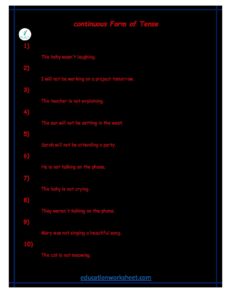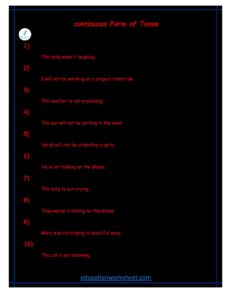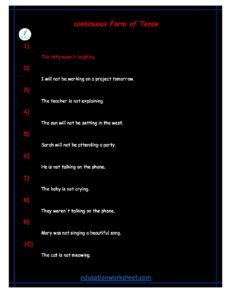how to converting continuous tense interrogative sentences to positive form
how to converting continuous tense interrogative sentences to positive form
Understanding Continuous Tense and Interrogative Sentences:
Before we dive into converting these sentences, let’s clarify what continuous tense and interrogative sentences are.
Continuous Tense: Continuous tenses, also known as progressive tenses, indicate actions that are ongoing, in progress, or occurring at a specific moment in time. These tenses are formed using a form of “to be” (am, is, are, was, were) and the base form of the verb, followed by the present participle (-ing) of the main verb. For example, “He is eating” or “They were running.”
Interrogative Sentences: Interrogative sentences are questions that seek information or clarification. They are formed by inverting the subject and the auxiliary verb (e.g., “Is she coming?”). Interrogative sentences often begin with question words like “who,” “what,” “when,” “where,” “why,” or “how.”
Converting Continuous Tense Interrogative Sentences to Positive Form:

To convert a continuous tense interrogative sentence into a positive form, you need to change its structure and verb forms. Here are the key steps:
- Identify the Sentence Type:
- Start by identifying the interrogative sentence you want to convert. Determine whether it is in the present continuous or past continuous tense.
- Remove the Inversion:
- In interrogative sentences, the subject and auxiliary verb are inverted. To make it a positive statement, remove this inversion. For example:
- Interrogative: “Is she playing tennis?”
- Positive: “She is playing tennis.”
- In interrogative sentences, the subject and auxiliary verb are inverted. To make it a positive statement, remove this inversion. For example:
- Change the Verb Forms:
- Replace the auxiliary verb with its appropriate form of “to be” (am, is, are, was, were) according to the tense. Then, replace the “-ing” form of the main verb with the base form.
- Present continuous: “is” or “are”
- Past continuous: “was” or “were”
- Replace the auxiliary verb with its appropriate form of “to be” (am, is, are, was, were) according to the tense. Then, replace the “-ing” form of the main verb with the base form.
Present Continuous to Positive Form:

- Interrogative: “Are they eating dinner?”
- Positive: “They are eating dinner.”
Past Continuous to Positive Form:
- Interrogative: “Was he watching TV?”
- Positive: “He was watching TV.”
- Revise the Sentence:
- Once you’ve made these changes, review the sentence to ensure it reads smoothly and conveys the intended meaning in a positive statement form.
Additional Considerations:
- Subject-Verb Agreement: Ensure that the subject and verb agree in terms of number (singular or plural). Use “is” with singular subjects and “are” with plural subjects for the present continuous tense, and “was” with singular subjects and “were” with plural subjects for the past continuous tense.
- Context: Consider the context of the conversation when converting a question into a statement. Ensure that the resulting sentence makes sense within the given context.
- Punctuation: Use the appropriate punctuation for positive statements, typically ending with a period (full stop).
- Tense Consistency: Maintain tense consistency when converting questions into statements. The tense of the converted statement should match the original tense of the question.
Practice Examples:
To reinforce your understanding, here are a few practice examples of converting continuous tense interrogative sentences to positive form:
- Interrogative: “Are you listening to music?”
- Positive: “You are listening to music.”
- Interrogative: “Were they playing soccer?”
- Positive: “They were playing soccer.”
- Interrogative: “Is she studying for the exam?”
- Positive: “She is studying for the exam.”
- Interrogative: “Was it raining when you left?”
- Positive: “It was raining when you left.”
- Interrogative: “Are we going on a trip this weekend?”
- Positive: “We are going on a trip this weekend.”
By following the steps and examples provided in this guide, you can effectively convert continuous tense interrogative sentences into positive statements. This skill is essential for clear and concise communication in English, whether in writing or in everyday conversation. Practice and familiarity with sentence structure and verb forms will further enhance your proficiency in this aspect of grammar.
how to converting continuous tense interrogative sentences to positive form


